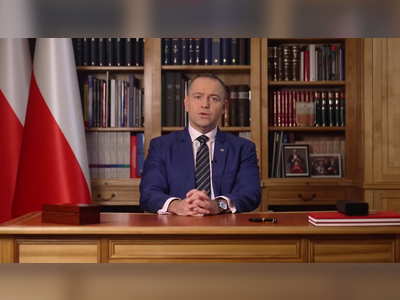Erasmus Bridge Stabbing Suspect Denies Terrorism Allegations: Claims Psychotic Episode
As the Rotterdam stabbing suspect Ayoub M. faces charges of murder with a terrorist motive, questions arise over his mental state during the attack.
In a case that has sent ripples of shock across the Netherlands, Ayoub M., the suspect in the deadly stabbing on Rotterdam's Erasmus Bridge, has denied accusations of terrorism.
During the preliminary hearing, it emerged that M., visibly emotional at the proceedings, insists he was suffering a psychotic episode when the incident occurred.
This initial court session refrained from delving into the case’s substantive details.
The attack, which transpired on the evening of September 19, resulted in the death of a 32-year-old German national and left a 33-year-old Swiss man seriously wounded.
Ayoub M., 22, vehemently denied any affiliations with terrorist organizations, stating, 'I have never been a terrorist and I do not support any terror groups.'
The prosecution, however, contends that M.'s actions were driven by a terrorist motive, citing witness reports that allege he shouted 'Allahu Akbar' during the attack.
The prosecutor further noted that M.
appeared intent on maximizing casualties at the location, a popular social hub and thus a potential terror target.
An examination of M.'s mobile phone revealed searches for Islamic State execution videos, further complicating his defense.
Despite these assertions, M.
maintains that he was not in control of his faculties, attributing his mental state to changes in his medication.
In past statements, he admitted to targeting the German victim, Philipp, purely because he deemed him an 'unbeliever', associating all beardless men with infidelity.
M.'s retrospective claim of psychosis has been met with skepticism pending a thorough investigation.
Central to unraveling the complexities of M.'s mental health is the anticipated evaluation at the Pieter Baan Centre, pending the procurement of his complete medical records.
Prior evaluations had already diagnosed M.
with a mental disorder, a factor in his previous sentencing involving an attack on his mother in 2022, for which he received conditional psychiatric treatment (TBS).
This preliminary hearing marks the start of a long judicial process, with substantive proceedings not expected to commence until the latter half of next year.
The case now pivots on verifying the validity of M.’s claims of psychosis, which will fundamentally influence the courtroom’s eventual assessments.
As this high-profile case unfolds, it remains emblematic of the broader societal challenges in balancing mental health issues with public safety and legal accountability.
During the preliminary hearing, it emerged that M., visibly emotional at the proceedings, insists he was suffering a psychotic episode when the incident occurred.
This initial court session refrained from delving into the case’s substantive details.
The attack, which transpired on the evening of September 19, resulted in the death of a 32-year-old German national and left a 33-year-old Swiss man seriously wounded.
Ayoub M., 22, vehemently denied any affiliations with terrorist organizations, stating, 'I have never been a terrorist and I do not support any terror groups.'
The prosecution, however, contends that M.'s actions were driven by a terrorist motive, citing witness reports that allege he shouted 'Allahu Akbar' during the attack.
The prosecutor further noted that M.
appeared intent on maximizing casualties at the location, a popular social hub and thus a potential terror target.
An examination of M.'s mobile phone revealed searches for Islamic State execution videos, further complicating his defense.
Despite these assertions, M.
maintains that he was not in control of his faculties, attributing his mental state to changes in his medication.
In past statements, he admitted to targeting the German victim, Philipp, purely because he deemed him an 'unbeliever', associating all beardless men with infidelity.
M.'s retrospective claim of psychosis has been met with skepticism pending a thorough investigation.
Central to unraveling the complexities of M.'s mental health is the anticipated evaluation at the Pieter Baan Centre, pending the procurement of his complete medical records.
Prior evaluations had already diagnosed M.
with a mental disorder, a factor in his previous sentencing involving an attack on his mother in 2022, for which he received conditional psychiatric treatment (TBS).
This preliminary hearing marks the start of a long judicial process, with substantive proceedings not expected to commence until the latter half of next year.
The case now pivots on verifying the validity of M.’s claims of psychosis, which will fundamentally influence the courtroom’s eventual assessments.
As this high-profile case unfolds, it remains emblematic of the broader societal challenges in balancing mental health issues with public safety and legal accountability.











